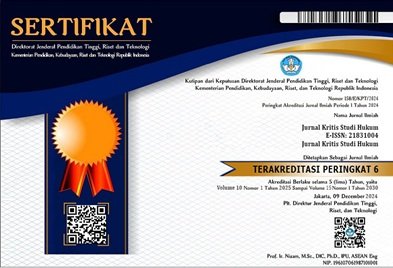KONTROVERSI DAN IMPLIKASI: KAJIAN TERHADAP PUTUSAN MAHKAMAH KONSTITUSI NOMOR 104/PUU-XXI/2023 MENGENAI BATAS MINIMUM USIA CAWAPRES
Kata Kunci:
Mahkamah Konstitusi, Batas Usia, Calon Presiden, Demokrasi, Kepemimpinan, Partisipasi PublikAbstrak
Mahkamah Konstitusi Republik Indonesia (MKRI) memainkan peran vital sebagai lembaga peradilan konstitusional, menjaga supremasi hukum dan prinsip demokrasi sesuai dengan amanat Undang-undang Dasar 1945. Salah satu keputusan penting yang diambil ialah adalah Mahkamah Konstitusi Nomor 104/PUU-XXI/2023, yang menetapkan batas usia minimum bagi calon presiden dan wakil presiden. Penelitian ini bertujuan untuk menganalisis implikasi dari keputusan tersebut terhadap proses demokrasi dan kepemimpinan indonesia. Keputusan ini bukan hanya berkaitan dengan aspek hukum, tetapi juga menciptakan ruang untuk diskusi lebih luas mengenai kualifikasi pemimpin, termasuk relevansi batas usia dalam menentukan kualitas kepemimpinan. Kontroversi muncul antara argumen yang menekankan batas usia sebagai indikator penting untuk pengalaman dan kematangan, versus pandangan bahwa batas tersebut tidak mencakup semua aspek kualitas seorang pemimpin. Melalui tinjauan dari berbagai perspektif peneliti, seperti Cecep Prayatno dan Tri Susilowati, serta analisis tentang dampak keputusan ini terhadap kepercayaan masyarakat terhadap sistem politik, penelitian ini mengungkap kompleksitas peran MKRI. Diharapkan bahwa hasil analisis ini dapat memberikan pemahaman yang lebih mendalaman mengenai bagaimana keputusan hukum memengaruhi dinamika politik dan partisipasi publik dalam sistem Demokrasi Indonesia.
The Constitutional Court of the Republic of Indonesia (MKRI) plays a vital role as a constitutional judicial institution, maintaining the supremacy of law and democratic principles in accordance with the mandate of the 1945 Constitution. One of the important decisions taken is the Constitutional Court Number 104/PUU-XXI/2023, which sets the minimum age limit for presidential and vice presidential candidates. This research aims to analyze the implications of the decision on the democratic and leadership process in Indonesia. This decision is not only related to legal aspects, but also creates space for a broader discussion regarding leader qualifications, including the relevance of the age limit in determining the quality of leadership. Controversy arises between arguments that emphasize the age limit as an important indicator of experience and maturity, versus the view that the limit does not cover all aspects of a leader's quality. Through a review of various researcher perspectives, such as Cecep Prayatno and Tri Susilowati, as well as analysis of the impact of this decision on public trust in the political system, this study reveals the complexity of the role of the MKRI. It is hoped that the results of this analysis can provide a deeper understanding of how legal decisions affect political dynamics and public participation in the Indonesian democratic system.





